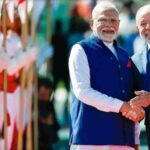
Korean governor warns of Trump’s threats and rapidly growing competition from Chinese exporters in the global market
South Korea’s export-oriented economy is more at risk from Donald Trump’s trade policies than the domestic political crisis, the country’s central bank governor said.
In an interview with Financial TimesBank of Korea Governor Rhee Chang-yong acknowledged that “critical structural reforms” for the South Korean economy and financial markets would be delayed due to fallout from President Yoon Suk Yeol’s failed attempt to impose martial law this week .
However, he said the economic impact of the political crisis in Seoul would be “limited” when compared to the possible consequences for Korean exporters due to intensifying Chinese competition and the heavy tariffs that Trump is expected to impose on the US’s main trading partners.
“There’s a lot of uncertainty,” Rhee said. “But compared to domestic factors, external factors are giving us much more uncertainty at the moment.
“The threat of tariffs [de Trump] is one of the main reasons we have revised down our growth forecast for this year and beyond,” added Rhee. “Export growth was going well this year, but we have now revised our export growth projections downward for two reasons: one is possible tariffs, and the other is that China’s competitiveness is growing rapidly, both within China and outside of it.”
Even before this week’s political drama, South Korea’s economy, Asia’s fourth-largest, was dealing with weak domestic demand and high household debt, as well as growing competition from Chinese exporters. Last week, the central bank unexpectedly cut interest rates, with the governor citing concerns about a “red wave” in the US, referring to Trump’s victory and Republican gains.
But Rhee highlighted that the impact of Yoon’s attempted martial law on the country’s financial markets was “short-lived and relatively contained.”
After Yoon announced his decree late on Tuesday, South Korea’s offshore stock market index fell more than 6%, while the won weakened nearly 3% against the dollar.
However, following an emergency meeting with the finance minister and top financial regulators, Rhee committed to implementing “unlimited” liquidity in the country’s financial markets if necessary.
When trading opened the next morning in Seoul, Yoon announced his intention to revoke the martial law order. Investors remained relatively calm despite the turbulence, with the country’s stock exchange Kospi index recording a 6% drop by Thursday’s close compared to Tuesday’s close.
“[Nossas] Rapid and comprehensive prevention measures quickly calmed and stabilized the financial market,” said Rhee.
South Korea is bracing for prolonged political turmoil, with Yoon facing an impeachment vote in the country’s National Assembly on Saturday. However, Rhee noted that the South Korean economy has overcome two presidential impeachment crises in recent times, in 2004 and 2017.
The governor said he was “encouraged” by the emerging political consensus on the need to strengthen protections for minority shareholders in listed companies in South Korea, although he admitted that the government’s corporate governance initiative will be delayed by the political crisis.
However, he rejected the argument made by some observers this week that Yoon’s decree and the resulting crisis vindicated the position of index creators like MSCI, who have resisted calls in South Korea for the country to be elevated to the developed market status.
“I can understand if you say that [o status de mercado emergente da Coreia do Sul] it’s because of the problem with North Korea or our capital controls. But I’ve never heard people at MSCI say, ‘That’s because your democracy isn’t mature enough,’” Rhee said.
With information from the Financial Times*
Source: https://www.ocafezinho.com/2024/12/06/ameaca-das-tarifas-de-trump-pesa-mais-que-a-crise-da-lei-marcial/

